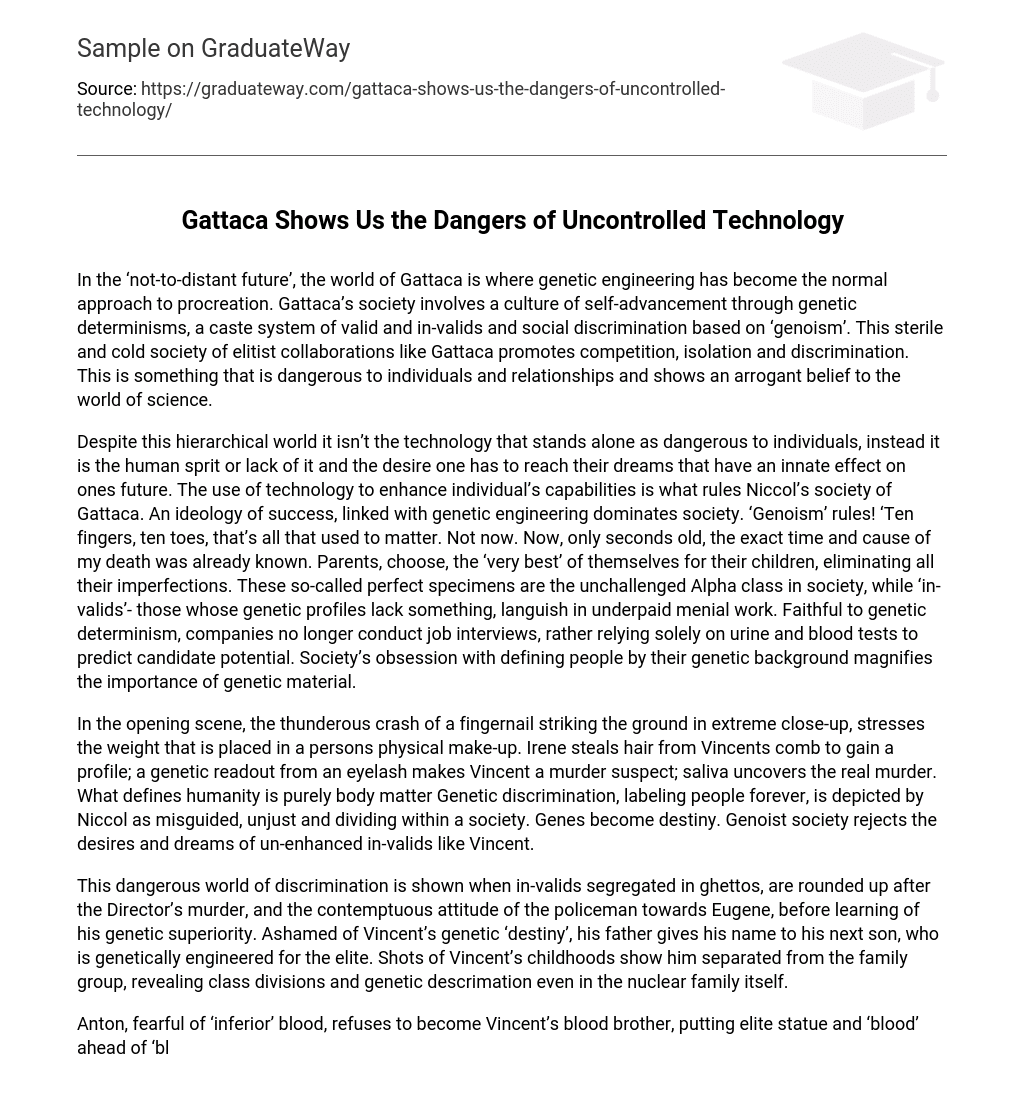In the future, the world of Gattaca has embraced genetic engineering as the standard method of reproduction. Gattaca’s society revolves around self-improvement through genetics, with a caste system dividing individuals into valids and in-valids, resulting in social discrimination known as ‘genoism’. The elitist and sterile environment of Gattaca fosters competition, isolation, and discrimination, posing a threat to individuals and relationships. It also demonstrates an arrogant faith in the realm of science.
Despite the existence of a hierarchical world, it is not technology itself that poses a danger to individuals. Instead, it is the human spirit or lack thereof, along with one’s desire to achieve their dreams, that profoundly affects their future. The society depicted in Gattaca, directed by Niccol, revolves around using technology to enhance individuals’ abilities. Genetic engineering and the idea of success dominate this society, with the concept of ‘Genoism’ at the forefront. In the past, all that mattered was having ten fingers and ten toes. However, now, immediately after birth, one’s exact time and cause of death are already known. Parents now choose the best versions of themselves for their children, eliminating all imperfections. These seemingly perfect individuals make up the elite Alpha class within society, while those with genetic deficiencies (known as ‘in-valids’) find themselves stuck in low-paying menial jobs. Companies have abandoned traditional job interviews and rely solely on urine and blood tests to assess candidates’ potential, remaining faithful to genetic determinism. Society’s obsession with categorizing people based on their genetic makeup amplifies the significance of genetic material.
In the opening scene, the powerful sound of a fingernail hitting the ground in extreme close-up emphasizes the significance placed on an individual’s physical composition. Irene steals hair from Vincent’s comb in order to acquire his characteristics; a genetic analysis from an eyelash implicates Vincent in a murder; saliva reveals the true culprit. The essence of humanity lies solely in bodily substances. Within society, Niccol portrays genetic discrimination as misguided, unjust, and divisive. Genes determine one’s fate. A genoist society disregards the aspirations and ambitions of un-enhanced in-valids such as Vincent.
In this hazardous world of prejudice, evidence of discrimination is displayed through the segregation of in-valids into ghettos. They are later rounded up following the Director’s assassination, highlighting the disdainful treatment Eugene receives from the policeman, oblivious to his superior genetics. Vincent’s father, feeling ashamed of Vincent’s predetermined genetic makeup, bestows his name upon his next son, who is specifically engineered for the privileged class. Through childhood snapshots of Vincent, we witness his isolation within the family unit, uncovering societal divisions based on class and genetic superiority even within close-knit families.
Anton refuses to become Vincent’s blood brother due to his fear of “inferior” blood, valuing social status and bloodline over familial relations. Vincent is denied education due to insurance limitations, highlighting the discriminatory and perilous nature of a world shaped by unregulated technology. When Vincent scrubs away his genetic material, the shadows that criss-cross his body resemble prison bars, symbolizing the confinement imposed by his predetermined genetic fate and society’s expectations of his potential and role. He emerges as a defiant individual.
Vincent’s ability to surpass his predicted genetic fate is highlighted as he diligently manipulates and fabricates genetic materials, showcasing the effort needed to defy society’s predestined future. By demonstrating “there is no gene for fate,” Vincent not only questions the idea of allowing genetic potential to dictate one’s destiny but also inspires others as he embarks on his journey towards success. His triumphs over Anton in swimming twice exemplify that genes are not the sole determining factor – “The impossible happened.”
Despite his blurred vision, Vincent crosses the highway, proving that he is not as weak as he appears. In contrast, the police investigating the murder are blind to the truth. The future of an individual is determined by their psychological strengths, rather than their physiological fate, and Vincent demonstrates this. His defects give him a spirit that Eugene, Josef, and Anton lack. Niccol criticizes the obsession with genetics for blinding people to reality.
The film critiques the false principles behind genetic engineering and eugenics, which seek to eliminate all undesirable traits and imperfections. Despite living in this artificially perfected world, human emotions still strive for freedom. Individuals quietly resist the system, and loyalty, love, and individuality persist. The film suggests that the human spirit remains resilient and can counterbalance the negative forces of an oppressive society. While uncontrolled technology poses a threat, it can also be overcome.





